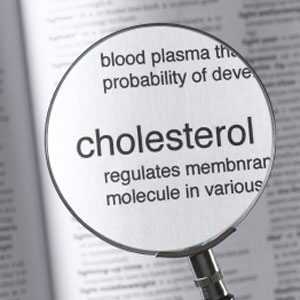
Yes, cholesterol can be bad for your heart. But the cholesterol issue isn't nearly this simple - your body actually needs some of it. If you're confused, this article is for you.
Background
Cholesterol belongs to a type of fat call a "sterol" (hence the name "chole-sterol").
According to the general definition, "cholesterol is a sterol found in cell membranes of all animal tissues that is also necessary for production of bile (gall) and steroid hormones" (Mahan & Escott-Stump, 2000).
This definition immediately indicates that although cholesterol may have negative effects when it blocks the arteries, it is also necessary for the production of bile or gall produced by the gallbladder. This is used in digestion and the formation of so-called steroid hormones, which include the male and female sex hormones.
A form of cholesterol, called 7-dehydrocholesterol, is also used by the human body to make vitamin D, an essential vitamin that's becoming increasingly important in human nutrition.
Clearly, cholesterol plays a vital role in certain body processes and we can't do without it.
Two sources
In the body, cholesterol is obtained from two very different sources:
- Our own bodies, which synthesise cholesterol for the various important functions listed above: cell membrane integrity, and vitamin D and hormone production.
- Foods that contain animal fats.
So, even if you don't ingest a single gram of cholesterol from the food you eat, your body is still going to produce some cholesterol every day.
Sources of cholesterol in the diet
Fats from animals, like egg yolk, fatty meat (visible fat and the fat between the muscle tissues called "marbling"), fish, butter, cream, full-cream milk, high-fat cheeses, and all foods that contain these animal fats (e.g. biscuits, cakes, pies and tarts that are baked with butter) will contain various amounts of cholesterol.
However, all plant fats found in oils, margarine and foods produced with oil and margarine, and fatty plant foods such as avocado and nuts, don't contain any cholesterol.
Possible reasons for the 'cholesterol confusion'
Based on my experience, the confusion about cholesterol may arise from the following situations:
1) Despite cutting out all cholesterol and fatty foods from your diet, your blood cholesterol levels are still high.
The reason for this could be that your body tends to produce excessive amounts of cholesterol, no matter how little cholesterol you eat.
If you've tried every diet variation to lower your blood cholesterol to no avail, it may be an idea to ask your dietician or doctor to have your genetic makeup tested by a genetic laboratory. If your results indicate that you suffer from familial (genetic) hypercholesterolaemia (excess cholesterol in the blood), your doctor will treat you with medications like statins to lower your blood cholesterol levels.
2) Food manufacturers mislead the public
At the moment quite a few manufacturers of products like plant oils and margarine state "No cholesterol" or "Contains no cholesterol" or "Free of cholesterol/cholesterol-free" on their labels.
The irony is that no pure plant oil (sunflower, canola, olive, avocado or walnut oil) and no margarine that's made from pure plant oil will contain any cholesterol. So, for one manufacturer to state that oil X is "cholesterol-free" is nonsense because all similar oils are also cholesterol-free. With this misleading statement, the manufacturer creates confusion in the minds of the public, because such a statement implies that oil Y does contain cholesterol, which isn't true.
While we don't have labelling regulations in place that prevent this type of misleading statement on food labels, you just need to keep in mind that all pure plant oils and margarine made from pure plant oils is cholesterol-free.
Hopefully, we'll soon have new labelling regulations that will prevent a manufacturer from stating that his product is "cholesterol-free" when all similar products on the market also contain no cholesterol.
3) Other fats can also contribute to arteriosclerosis
Cholesterol isn't the only type of fat that can cause fatty deposits in the arteries. Other fats that have been identified as "atherogenic" (having a tendency to produce arteriosclerosis) are saturated fats and so-called trans-fatty acids.
Saturated fats also occur in all foods derived from animals (egg yolk, fatty meat, high-fat dairy products, baked products, etc) and plant fats that have been hydrogenated (hard, block margarine, coffee creamers, and pies, cakes, biscuits, tarts, etc, that have been baked with hydrogenated shortening). Check food labels to see if the food contains high levels of saturated fat or, if this isn't listed, check the ingredients list for the words "hydrogenated fats".
Trans-fatty acids are fats that may be formed during food processing, and some foods from animals also contain trans-fatty acids. After the uproar that was generated a few years ago when it was announced that trans-fatty acids were probably even more atherogenic than cholesterol, most food manufacturers quickly changed their formulations to ensure that their products don't contain high levels of trans-fatty acids. It is still a good idea to check food labels to see if they state "Free or Practically free of trans-fatty acids/trans-fats".
Summary
If you keep the following in mind regarding cholesterol, there should be less confusion:
- The human body makes its own cholesterol and some people make too much.
- Foods produced from animals and animal fats contain varying amounts of cholesterol.
- Pure plant oils and products made from pure plant fats don't contain cholesterol.
- Not all patients with high blood cholesterol levels will react when they reduce their dietary cholesterol intake. Such patients need medications to achieve lower blood cholesterol levels.
- Other fats such as saturated fats and trans-fatty acids can also increase fatty deposits in the arteries and cause heart disease. Such fats also need to be avoided if you have high blood cholesterol levels.
References:
(Mahan LK, Escott-Stump S (2000). Krause’s Food, Nutrition & Diet Therapy. 10th Edition. WB Saunders Co, Philadelphia, USA. )




 Publications
Publications
 Partners
Partners















